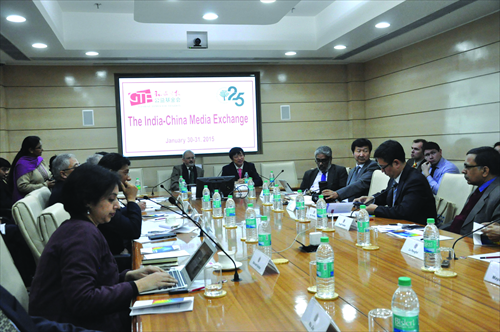Media plays role in Sino-Indian peace

A scene from the media exchange Photo: Gu Di/GT
Editor's Note:
The Sino-Indian relationship has seen robust development in the past few years. As Asian countries, both are considered as a regional powerhouse and approached by other major powers. Yet the lack of mutual trust and potential rivalry seem to hinder further development of bilateral ties. At the second India-China Media Exchange jointly held by the Global Times Foundation and India's Observer Research Foundation in New Delhi in late January, media professionals and experts from both countries shared their views on these matters of concern.
Hu Xijin, editor-in-chief of the Global Times
The election of Narendra Modi as India's prime minister caused a splash among global media outlets. In China, some believe Modi is a tough prime minister and others say that he is a nationalist. However, the fact is that Modi is a realist and patriot, as shown in his amicable attitude toward both China and the US.
In order to welcome US President Barack Obama, Modi met him at the airport; when Chinese President Xi Jinping visited India in September, Modi traveled thousands of kilometers accompanying Xi around his home state of Gujarat.
Just like former Chinese leader Deng Xiaoping, Modi is a realist, whose aim is to rejuvenate India's economy. Modi visited China's special economic zones and relatively developed regions many times when he served as chief minister of Gujarat. It's evident that he hopes to introduce China's experience of development into India.
A favorable external environment and a period of opportunity for peaceful development are required for India to boost the economy. At present, major global powers all pay high heed to developing friendly ties with India, which is of great significance to India. The country should seize the opportunity.
Modi is a patriot. When it comes to the border issue, we believe that the prime minister does not want the dispute to jeopardize bilateral relations.
C. Raja Mohan, a columnist associated with The Indian Express
There are six characteristics of Modi's foreign policy, which are developing the economy first, focusing on the neighborhood, securing a resolution of tensions on the borders, expanding India's engagement with Asian countries, expanding cooperation with major powers and learning from China in how to deal with multilateral issues.
Modi's foreign policy is similar to Deng's. When Deng became the leader of China, he utilized international cooperation to develop the country's capabilities. I believe Modi is trying to do exactly the same to open up India by collaborating with as many partners as possible to strengthen India's position in the international system. With a leader who is now taking the similar approach as Deng, it will be easier for India to get to know more about China.
The new government has taken charge when there was a slowdown in the economy, and reviving India's economic growth is the principal objective. In this regard, China has become very important. India recognizes that China is the biggest power in Asia, and India needs new dialogues with China. Previous Indian governments were hesitant about doing more business with China, while the present government has made it very clear that any Indian economic strategy must involve a significant role for China.
Lü Pengfei, chief correspondent of People's Daily stationed in India
My impression on The Times of India and the Hindustan Times over the past two-and-a-half years is that their reports about China are provocative. Private media outlets account for 99 percent, which, however, hold a similar stance.
The Times of India reported every month about China's "invasion" into India's border regions last year. The Hindustan Times even fabricated news about the China-Indian border dispute in 2013 and 2014. Indian media didn't tell the truth and they should be held responsible for why some Indians don't like China.
One of the divergences between the Chinese and Indian media is that the former emphasizes cooperation while the latter underscores conflicts regarding the border issue. I hope Indian media can play a constructive role in the bilateral relationship.
Ashok Malik, a Delhi-based political commentator
The economic relationship between our two countries has not reached anywhere close to the potential it could have. India complains that market access in China for Indian pharmaceutical product, IT services and IT workers, and generally low-cost facilities, all of which China needs, is blocked due to political reasons.
India's need for infrastructure is enormous. It needs ports, roads, highways, telecom infrastructure, and power infrastructure. China can provide all of these, and it is the infrastructure provider of Asia today. But there are security and political concerns that disturb the cooperation.
I hope you could convey to Chinese society that the present Indian government and Indian society are seriously sticking to the "Make in India" program, and the desire to make India a manufacturing economy is very serious and deep rooted in India. India wants to bring prosperity to a billion plus people. I do hope this media dialogue can help reconcile the collision and clarify the scope of economic advance between our two countries.